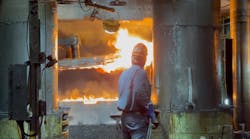So That Happened: Oshkosh Takes to the Air, The Beauty of Nearby Steel Mills and Educational Robots
Editor’s note: Welcome to So That Happened, our editors’ takes on things going on in the manufacturing world that deserve some extra attention. This will appear regularly in the Member’s Only section of the site.
Raising the Roof on Unions
Workers at Webasto Roof Systems plant in Plymouth, Michigan, voted last week to join the United AutoWorkers union. The 99-to-79 vote in favor of the UAW is the latest installment of union activity at U.S. auto suppliers in recent months.
Webasto, a German company, manufactures convertible roofs for Mustangs, Jeeps, Broncos and Corvettes at the 200-employee Plymouth location. Workers at the plant told the UAW they wanted more reliable schedules and to be treated as valued team members rather than “just a number.”
“This win goes on to prove that we are continuing to get back to our roots and get back in the fight,” UAW President Shawn Fain told membership in a Facebook Live town hall last week.
Meanwhile, strikes continue at suppliers Clarios near Toledo, Ohio (now in its fourth week) and Constellium Automotive in Van Buren, Michigan, near Detroit (now in its second week.)
Bargaining at the newly unionized GM/LG partnership Ultium battery plant in Youngstown, Ohio, is a priority for the union as it heads into negotiations with the Detroit Three automakers in September, Fain said. Ultium will “set the table” for talks around the EV transition.
“Right now, our members from Ultium, they’re over there working $16.50 an hour starting wage and a seven-year progression to $20 an hour,” he said. “These people are working around chemicals that aren’t even regulated by OSHA yet. So, we’ve raised that awareness with government officials—some of our members are out in D.C. right now speaking with our congressional members to talk about the conditions there.”
Fain said Ford’s recent announcement of Blue Oval plants in Kentucky and Tennessee promises “11,000 jobs, billions of dollars in investment, and not one bit of commitment to our members right now. Same thing with Stellantis with the joint venture in Kokomo and with the Ultium plants … We’ve got a lot of work ahead of us.”
The Future of Automation Education
ABB’s Robotics Education Package, designed to introduce students to automation basics, includes a GoFa cobot, 56 hours of teaching materials and STEM certification.
“By enabling schools, colleges and universities to easily create and run robotics training courses that are recognized by industry, ABB’s Robotics Education Package is closing the technology skills gap by preparing students for the automated workplace,” says Andrea Cassoni, managing director, General Industries Business Line for ABB Robotics.
The first part of the package is the cobot; with no prior engineering knowledge, students as young as 15 can use the cobot to learn real-world applications like 3D printing and pick and place.
Second is the course material, which includes videos, interactive online exercises, 400 test questions and lab exercises. Teachers will have a suite of materials to go through 12 lessons ranging from basic to advanced levels.
Third is a globally recognized STEM certification; teachers can be certified by ABB, allowing them to then certify their students. The qualification serves as proof the student has ability to work with robotic automation and can be shown to employers in over 80 countries.
The Eye of the Beholder
Howmet Aerospace’s Cleveland Operations is home to one of the largest forging presses in the world, a 50,000-ton behemoth built in the 1950s as part of the U.S. Air Force’s Heavy Press Program and rebuilt in 2012 for $100 million. The press is a sight to behold – but not the only one at the company’s Harvard Road site, according to an anecdote shared by Howmet executive Markus Heinimann during the Ohio Space Forum held last week in Cleveland.
Heinimann, Howmet Aerospace vice president, technology and quality, was among the event’s speakers, and he discussed the value to Howmet of a robust, local supply chain network.
“For every Howmet, there’s probably hundreds of smaller suppliers that we work with for outside processing, whether they be machine shops, non-destructive and destructive testing, heat-treat facilities, you name it, they’re all out there. And they’re all working with us and other industries—and having access to that supply chain is crucial,” he said.
Heinimann punctuated his point with this tale: “Recently, I hired a new director of quality to work in our group, and he was standing on the fifth floor of our office building on Harvard Avenue looking north. And he commented on the beautiful view he had. … Somebody was walking by and said Cleveland has downtown but it’s not that beautiful.” The new quality director quickly corrected him, according to Heinimann, with these words: “I’m not talking about the skyscrapers. I’m talking about the fact that I can see three steel mills.”
“For somebody in manufacturing, having access to that infrastructure, to that workforce, that support network is crucial to our success,” Heinimann concluded.
Women CEOs Now Strongly Outnumber CEOs Named “John”
In 2015, the New York Times ran a story that found there were fewer women CEOs in the S&P 500 than there were CEOs named “John.” The story led to calls for improvement—successful calls, according to a recent Bloomberg report, which revisited the figure and found that women CEOs now outnumber those with a name similar to “John” (including Jons and Johnathans) at the top of S&P 500 companies by 41 women to 23 men named “John.”
Bloomberg’s numbers show that for the past 8 years, the number of women CEOs in the index has hovered close to the population of two other groups: CEOs with a name similar to “John” (including “John,” “Jon,” or “Johnathan”), and CEOs with the name “James.”
Since 2020, though, female CEOs have separately outnumbered both CEOs named John and CEOs named James, and last year saw a higher increase in women leading S&P 500 companies than previous years. The first year of the analysis to find more women CEOs than either group was in 2018, when the S&P 500 included 28 women CEOs and 25 CEOs named “James.”
The following year, those groups were tied at 25 members each, before 5 more women CEOs were hired in 2020.
Of course, 41 women CEOs out of 500 S&P companies does mean that only 8% of S&P 500 companies are led by women. But at least they’re not outnumbered by a men sharing a single common name—or group of names—anymore.
Oshkosh Bets on Airports Lift
A secular growth story that comes with a government-backed spending wave? Count in Oshkosh Corp.
The Wisconsin-based manufacturer of vehicles and equipment for a wide range of industries is preparing to add airports to that lineup with the proposed acquisition of JBT Corp.’s AeroTech group for about $720 million in cash.
John Pfeifer, Oshkosh’s president and CEO, said May 30 that the planned purchase of AeroTech will give his team a formidable foothold in the aviation ground support market—everything from aircraft tugs to boarding bridges and baggage systems—as well as a steady growth business. AeroTech generated about $575 million in sales last year and is forecast to have a growth rate in the mid- to high single digits in coming years, helped by $25 billion in projected spending on airports under the Infrastructure Investment and Jobs Act.
“This is right in our spot but, also, these are adjacent categories that are resilient over time,” Pfeifer said on a conference call with analysts.
Aerotech’s profits are recovering ground lost due to the COVID pandemic: The Oshkosh team expects that its estimated $40 million in EBITDA for the second half of this year will grow to $95 million in 2024, in part as an estimated $20 million in deal savings begin to materialize. One noteworthy detail about those synergies: They won’t come from consolidating manufacturing plants; Pfeifer said Oshkosh’s factories making fire trucks, defense vehicles and other gear are too busy to absorb more work.
Yet More Travails in Cybersecurity News
Cybersecurity firm Barracuda recently released a report about ‘spear-phishing’ cyberattacks. If you’re not familiar, where phishing casts a wide net across target organizations with unspecific emails, spear-phishing targets specific people or groups and uses information relevant to that target.
The African prince trying to get you to share your bank account information is a phishing attack. An email asking you to approve an invoice from one of your subordinates, if you’d just click on this link and add some information, is a spear-phishing attack.
According to the report, while spear-phishing made up for only 0.1% of email-based breach attempts at the surveyed organizations, spear-phishing attacks accounted for 66% of all breaches. That’s an excellent success rate and why manufacturers, who as we’ve said many times are collectively one of the most popular targets for cybercriminals, ought to be aware of and educating employees about this attack technique.
Continuing on the cybersecurity front, this may have nothing intrinsically to do with spear-phishing but on May 12, Toyota Motor Corp. announced that the car-location data of its over 2 million customer was exposed for 10 years—that's an entire decade—due to a ‘misconfiguration’ that allowed anyone to access without a password the contents of the relevant database. And today, May 21, Toyota added that part of the data was potentially accessible externally. Toyota adds that the data in question could not alone reveal and identify customers or access or affect related vehicles.
On May 20th, cyberattackers posted online data stolen from the German automotive and arms manufacturer Rheinmetall AG. The data included purchase orders, technical schematics, non-disclosure agreements and passport scans. Rheinmetall in a press release stressed that its military business was not affected by the attack, however.
—Dennis ScimecaAbout the Author

Laura Putre
Senior Editor, IndustryWeek
As senior editor, Laura Putre works with IndustryWeek's editorial contributors and reports on leadership and the automotive industry as they relate to manufacturing. She joined IndustryWeek in 2015 as a staff writer covering workforce issues.
Prior to IndustryWeek, Laura reported on the healthcare industry and covered local news. She was the editor of the Chicago Journal and a staff writer for Cleveland Scene. Her national bylines include The Guardian, Slate, Pacific-Standard and The Root.
Laura was a National Press Foundation fellow in 2022.
Got a story idea? Reach out to Laura at [email protected]
Anna Smith
News Editor
News Editor
LinkedIn: https://www.linkedin.com/in/anna-m-smith/
Bio: Anna Smith joined IndustryWeek in 2021. She handles IW’s daily newsletters and breaking news of interest to the manufacturing industry. Anna was previously an editorial assistant at New Equipment Digest, Material Handling & Logistics and other publications.
Jill Jusko
Bio: Jill Jusko is executive editor for IndustryWeek. She has been writing about manufacturing operations leadership for more than 20 years. Her coverage spotlights companies that are in pursuit of world-class results in quality, productivity, cost and other benchmarks by implementing the latest continuous improvement and lean/Six-Sigma strategies. Jill also coordinates IndustryWeek’s Best Plants Awards Program, which annually salutes the leading manufacturing facilities in North America.
Have a story idea? Send it to [email protected].
Ryan Secard
Associate Editor
Ryan Secard joined Endeavor B2B in 2020 as a news editor for IndustryWeek. He currently contributes to IW, American Machinist, Foundry Management & Technology, and Plant Services on breaking manufacturing news, new products, plant openings and closures, and labor issues in manufacturing.
Geert De Lombaerde
Senior Editor
A native of Belgium, Geert De Lombaerde has been in business journalism since the mid-1990s and writes about public companies, markets and economic trends for Endeavor Business Media publications, focusing on IndustryWeek, FleetOwner, Oil & Gas Journal, T&D World and Healthcare Innovation. He also curates the twice-monthly Market Moves Strategy newsletter that showcases Endeavor stories on strategy, leadership and investment and contributes to other Market Moves newsletters.
With a degree in journalism from the University of Missouri, he began his reporting career at the Business Courier in Cincinnati in 1997, initially covering retail and the courts before shifting to banking, insurance and investing. He later was managing editor and editor of the Nashville Business Journal before being named editor of the Nashville Post in early 2008. He led a team that helped grow the Post's online traffic more than fivefold before joining Endeavor in September 2021.
Dennis Scimeca
Dennis Scimeca is a veteran technology journalist with particular experience in vision system technology, machine learning/artificial intelligence, and augmented/mixed/virtual reality (XR), with bylines in consumer, developer, and B2B outlets.
At IndustryWeek, he covers the competitive advantages gained by manufacturers that deploy proven technologies. If you would like to share your story with IndustryWeek, please contact Dennis at [email protected].



